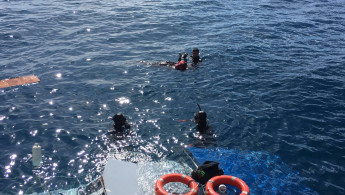Over 90 die crossing Mediterranean from Libya, says MSF Sea
Over 90 people have died in international waters attempting to reach Europe from Libya in an overcrowded boat on Friday night, Medecins Sans Frontieres Sea has said.
Four survivors have since been forcibly returned to Libya, MSF Sea told The New Arab on Sunday.
The small vessel spent many days at sea before running into difficulties amid challenging weather conditions, according to those who survived.
A commercial tanker, the Alegria 1, rescued the only four people still alive early on Saturday.
The tanker then turned for Libya, refusing offers of medical assistance and ignoring pleas to deliver survivors to a recognised port of safety.
The four survivors have now been disembarked at a port in Libya according to Caroline Willemen, currently at sea with MSF search and rescue vessel Geo Barents.
"It's a double tragedy, what happened with this boat," Willemen told TNA. "It's obvious that the vast majority of people on board did not survive the journey. The four people who survived reported leaving Libya with around 100 passengers."
"The survivors picked up by the oil tanker were then undoubtedly in need of medical care, and had been through the trauma of watching dozens and dozens of people die around them. Our offer to provide assistance was ignored, and based on the information we have, they were returned to Libya," she said.
The Geo Barents, MSF's Mediterranean rescue vessel, released recordings of the ship's communications with the Alegria 1 after the tanker turned for Libya.
"We just want to remind you that under SAR convention, SOLAS convention and international law, all the people who are rescued at sea must be disembarked in the nearest safest port," said the search and rescue team leader.
"Due to the condition that people might suffer in Libya, any port in Libya can not be considered a safe port," he added.
The identity of those who died is not yet known, and the names of the survivors have not been released by the Alegria 1.
The master of the ship has the obligation to assure that rescued people are disembarked safely and quickly at the closest place of safety, a location where the survivors' safety of life is no longer threatened and where their basic human needs are respected. #Alegria1 pic.twitter.com/lgJXywQb3z
— MSF Sea (@MSF_Sea) April 2, 2022
"While attitudes to mass movement of people inside Europe are shifting, non-European migrants are still forced to risk their lives crossing the Mediterranean in full view of the EU," said one NGO worker speaking to the New Arab on condition of anonymity.
Attempts to cross the Mediterranean normally drop during winter and spring when weather conditions make the sea very risky for small boats - but NGO vessels have reported high numbers over the past months.
The International Organization for Migration described 2021 as the deadliest for migration routes to and within Europe since 2018. At least 1,315 people died on the central Mediterranean crossing last year.
"A rescue at sea only ends when the people who are rescued are disembarked in a place of safety. Of course, we know very well that there is not a port in Libya that can be considered a place of safety," said Willemen.





 Follow the Middle East's top stories in English at The New Arab on Google News
Follow the Middle East's top stories in English at The New Arab on Google News


